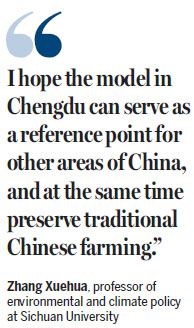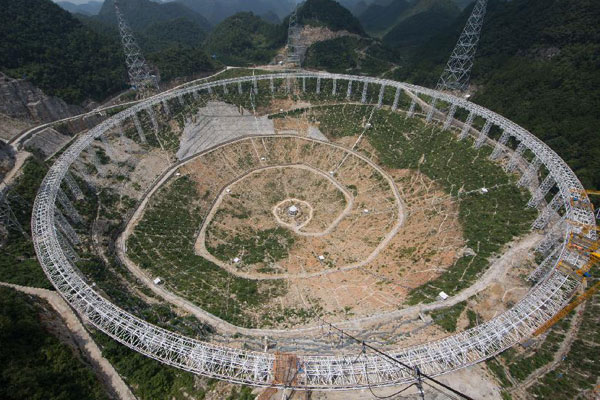Can China and the US feed each other?
Updated: 2015-07-31 11:44
By Dong Leshuo and Hua Shengdun(China Daily USA)
|
|||||||||
Chinese food safety and sustainability was on the menu at a Washington think tank as speakers looked into challenges and opportunities for China and the US on food safety issues, a major concern.
Zhang Xuehua, professor of environmental and climate policy at Sichuan University, shared a study on a sustainable model village in Chengdu, Sichuan province in China at Wilson Center on Tuesday.
Anlong village exhibited two key aspects of China's water problems: quality and quantity. Too many villages in China are facing water pollution and water shortage problems at the same time, Zhang said.
Zhang has been working with Chengdu Urban River Association (CURA), a non-profit organization founded in 2003, to work out a plan to integrate agricultural pollution control and ecological farming in Anlong.
Through CURA's efforts, eco-infrastructures have been installed for 160 households benefiting 500 people in the village.
"I hope the model in Chengdu can serve as a reference point for other areas of China, and at the same time preserve traditional Chinese farming," Zhang said.

The dairy industry also lies in the center of the issue of food safety in China.
For China's dairy industry, the integrated models "were intended to improve coordination and control in the dairy value chain. Instead, they posed risks for rural development objectives and food safety," said Sabrina Snell, research fellow at the US-China Economic and Security Commission.
In Snell's opinion, dairy regulatory challenges in China stem from structural issues in the way the state interacts with business, and not from a lack of legislation or value chain models.
To improve food safety and ensure the dairy industry's sustainable development in China, they must first consider the state-to-business relationships through which legal and value chain solutions are operationalized, according to Snell.
Snell thinks that some efforts that have been introduced by the Chinese government might prove effective.
"You will see increased central transfers for the local areas in the dairy industry, like China National Cereals, Oils and Foodstuffs Corporation majority stake in Mengniu. And you will see recentralization of some dairy companies and some fiscal recentralization and direct provincial supervision of counties," Snell said.
"Of course the US is very interested in food safety issues in China and I believe we import over 10 billion in agriculture products," Snell said. "Ultimately we want to see domestic dairy brands succeed,"
China's rising demand for US food means a lot for US agriculture, everything from US food companies, to individual US farmers.
Andi Zhang in Washington contributed to this story.
leshuodong@chinadailyusa.com
- Gala promotes gender equality
- Trafficked woman appeals to be left alone, continue her life
- Wreckage discovery shouldn't disrupt search: MH370 families
- 3,000 students attend pre-exam session in huge hall
- 38.7b yuan in State assets recovered in campaign
- China closely watches recovery of Boeing debris: spokesman

 Top 10 international destinations for Chinese millionaires
Top 10 international destinations for Chinese millionaires
 Rainstorm affects 940,000 in South China
Rainstorm affects 940,000 in South China
 Do you take all your paid leave?
Do you take all your paid leave?
 National Art Museum of China displays Polish folk art
National Art Museum of China displays Polish folk art
 Chinese soldiers in parades
Chinese soldiers in parades
 US Marines Corpos soldiers demonstrate martial arts
US Marines Corpos soldiers demonstrate martial arts
 World's largest radio telescope being built
World's largest radio telescope being built Elvis Festival pays tribute to the King of Rock 'n' Roll
Elvis Festival pays tribute to the King of Rock 'n' Roll
Most Viewed
Editor's Picks

|

|

|

|

|

|
Today's Top News
Chinese defense concerned about US moves in South China Sea
Chinese named in test-taking scam deported from US
Baidu to buy back shares worth $1b
Former military leader Guo Boxiong expelled from CPC, to face justice
Pair to face poaching charges related to death of popular lion
Amazon wants air space for delivery drones
Embassy continues its work in aftermath of car bombing
Netizens pack heavy wallets
US Weekly

|

|







